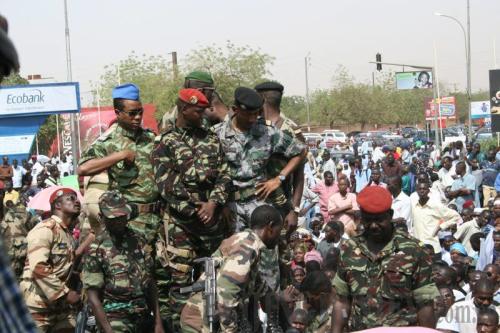|
 |
|
CHEERING FOR CHANGE: Thousands gather outside the parliament building in Niger's capital, Niamey, on February 20 in support of a military coup that overthrew Nigerian President Mamadou Tandja (CFP) |
For a little more than a year, Africa has witnessed a sharp upswing in military coup d'états—along with the civil, political and social upheaval that has ensued. But following long decades of such strife, hope may finally be at hand as international resistance mounts against African military juntas.
In recent months, the people of Mauritania, Guinea, Guinea-Bissau and Madagascar, to name a few, have all experienced military uprisings and suffered dearly as a result.
On February 18, Niger fell victim to the most recent African coup after mutinous soldiers stormed the presidential palace in Niamey and kidnapped President Mamadou Tandja.
It was a depressingly familiar scenario for the Sahel nation, marking the fourth such overthrow of a head of state in the former French colony since it declared independence in 1960.
Compared with its previous coups, however, the takeover was relatively mild. The troops took control in two hours, and only three presidential palace guards were killed in the process.
Beyond that, the coup itself had scant impact on Niger's social stability. Unfortunately, this relative bloodlessness has not been the norm elsewhere in recent African history.
In December 2008, Guinea's military leader Captain Moussa Dadis Camara took control over the West African nation in a violent coup that was preceded by the death of President Lansana Conte by a matter of hours.
More recently, in September 2009, military forces under Captain Camara's control massacred more than 150 people while suppressing a mass demonstration in Conakry, the capital of the Francophone nation.
In early March 2009, Guinea-Bissau, a small former Portuguese colony, also witnessed a military coup. President Joao Bernardo Vieira was killed in a bomb attack, although the rebellious soldiers ultimately failed to overthrow his government.
Later that same month, a military uprising shook the East African island nation of Madagascar. Opposition demonstrators clashed with government loyalists, leaving more than 300 people dead or wounded. Rebellious soldiers backed by the opposition proceeded to occupy the presidential palace and force President Marc Ravalomanana to cede power to opposition leader Andry Rajoelina.
These military rebellions have reached an apex throughout Africa in the past decade. They also reveal the degree to which the long-standing issue of military interference in politics remains unresolved.
These spasms of unrest have also underscored the degree to which poorer or smaller African countries—such as Mauritania, Guinea-Bissau and Niger—are particularly vulnerable to military coups. Dire poverty and political and social turbulence, meanwhile, are all too often just further depressing factors in the equation.
Under the shadow of such instability, Africa's movements toward democracy—fraught with challenges in the best of times—are faced with more difficulties than ever.
Factors
The reasons for the frequent outbreaks of military coups in Africa are often complex and vary from country to country. There are, however, certain commonalities that cannot be ignored.
The frequent military coups in Africa themselves are deeply rooted in history. The influence of colonialism, for example, remains heavy: A majority of African nations did not realize their independence from European powers until as recently as 50 years ago.
The harsh legacy of these negative external influences, moreover, has made it all but impossible for the political institutions vital to these African nations to mature in a healthy way.
Consequently, many of these young nations lack a good model to cultivate prosperity with strong civic participation and even balances of power.
Such weaknesses have precluded these governments from managing their countries effectively. Depending on military forces, meanwhile, has thus yielded a quicker, more convenient way for governments and their leaders to exert control over their populations while maintaining social stability.
The army has, as a result, become the ultimate special interest group in many African countries. Not merely confined to safeguarding national sovereignty, African military leaders have now become fully involved in the affairs of all aspects of society. And this is a serious problem.
Moreover, since the 1990s, Western nations have actively promoted "democratization" in Africa by cashing in on their global strategic advantages gained after the end of the Cold War. In ways, these powers have declared this endeavor "Africa's Second Liberation."
Currently, Western-style democracy and multi-party systems have become a political norm in Africa. But they still seem incompatible with the political culture of many African countries.
In particular, this speaks to the mosaics of ethnic groups that often divide African nations. In these countries, tribal affiliations can often trump national identity. Consequently, multi-party elections can devolve into ethnically driven elections. Tribes can thus fight fiercely for political power—something that may lead to military coups.
Guinea offers a powerful example. The Conakry government had long been controlled by the Malinke and Soussou ethnic groups—both of which boast large populations. Smaller tribes, unable to acquire representative authority and status, were therefore left dissatisfied.
| 